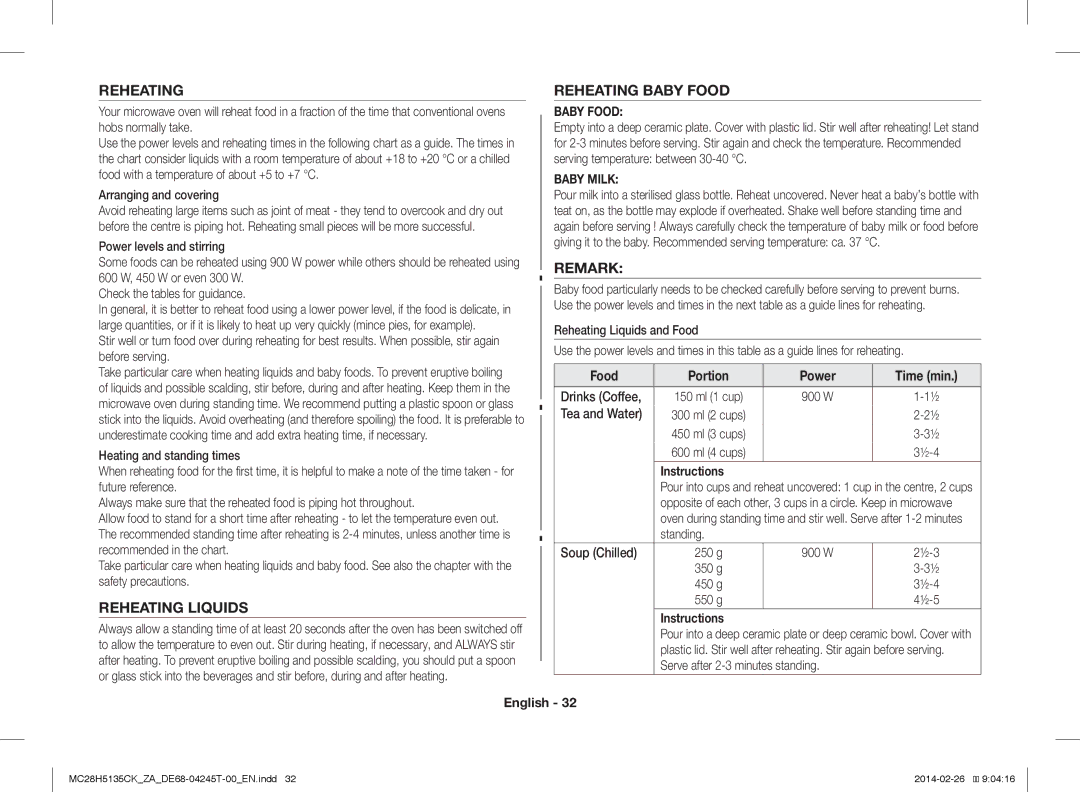
REHEATING |
|
|
| REHEATING BABY FOOD |
|
|
| ||
Your microwave oven will reheat food in a fraction of the time that conventional ovens |
|
| BABY FOOD: |
|
|
|
| ||
hobs normally take. |
|
| Empty into a deep ceramic plate. Cover with plastic lid. Stir well after reheating! Let stand | ||||||
Use the power levels and reheating times in the following chart as a guide. The times in |
|
| for | ||||||
the chart consider liquids with a room temperature of about +18 to +20 °C or a chilled |
|
| serving temperature: between |
|
|
| |||
food with a temperature of about +5 to +7 °C. |
|
| BABY MILK: |
|
|
|
| ||
|
|
|
|
|
|
|
|
| |
Arranging and covering |
|
| Pour milk into a sterilised glass bottle. Reheat uncovered. Never heat a baby’s bottle with | ||||||
Avoid reheating large items such as joint of meat - they tend to overcook and dry out |
|
| teat on, as the bottle may explode if overheated. Shake well before standing time and | ||||||
before the centre is piping hot. Reheating small pieces will be more successful. |
|
| again before serving ! Always carefully check the temperature of baby milk or food before | ||||||
Power levels and stirring |
|
| giving it to the baby. Recommended serving temperature: ca. 37 °C. |
| |||||
|
|
|
|
|
|
| |||
Some foods can be reheated using 900 W power while others should be reheated using |
|
| REMARK: |
|
|
|
| ||
600 W, 450 W or even 300 W. |
|
|
|
|
|
|
| ||
|
|
| Baby food particularly needs to be checked carefully before serving to prevent burns. | ||||||
Check the tables for guidance. |
|
| |||||||
|
| Use the power levels and times in the next table as a guide lines for reheating. | |||||||
In general, it is better to reheat food using a lower power level, if the food is delicate, in |
|
| |||||||
|
|
|
|
|
|
| |||
large quantities, or if it is likely to heat up very quickly (mince pies, for example). |
|
| Reheating Liquids and Food |
|
|
| |||
Stir well or turn food over during reheating for best results. When possible, stir again |
|
|
|
|
| ||||
|
| Use the power levels and times in this table as a guide lines for reheating. | |||||||
before serving. |
|
| |||||||
|
|
|
|
|
|
| |||
Take particular care when heating liquids and baby foods. To prevent eruptive boiling |
|
| Food | Portion | Power |
| Time (min.) | ||
of liquids and possible scalding, stir before, during and after heating. Keep them in the |
|
|
|
|
|
|
| ||
|
| Drinks (Coffee, | 150 ml (1 cup) | 900 W |
| ||||
microwave oven during standing time. We recommend putting a plastic spoon or glass |
|
|
|
| |||||
|
|
| Tea and Water) | 300 ml (2 cups) |
|
| |||
|
|
|
|
|
|
| |||
stick into the liquids. Avoid overheating (and therefore spoiling) the food. It is preferable to |
|
|
| ||||||
|
|
| 450 ml (3 cups) |
|
| ||||
underestimate cooking time and add extra heating time, if necessary. |
|
|
|
|
| ||||
Heating and standing times |
|
|
| 600 ml (4 cups) |
|
| |||
When reheating food for the first time, it is helpful to make a note of the time taken - for |
|
|
| Instructions |
|
|
| ||
future reference. |
|
|
| Pour into cups and reheat uncovered: 1 cup in the centre, 2 cups | |||||
Always make sure that the reheated food is piping hot throughout. |
|
|
| opposite of each other, 3 cups in a circle. Keep in microwave | |||||
Allow food to stand for a short time after reheating - to let the temperature even out. |
|
|
| oven during standing time and stir well. Serve after | |||||
The recommended standing time after reheating is |
|
|
|
| standing. |
|
|
| |
recommended in the chart. |
|
|
| Soup (Chilled) | 250 g | 900 W |
| ||
|
| ||||||||
Take particular care when heating liquids and baby food. See also the chapter with the |
|
|
| 350 g |
|
| |||
safety precautions. |
|
|
| 450 g |
|
| |||
REHEATING LIQUIDS |
|
|
|
| 550 g |
|
| ||
|
|
| Instructions |
|
|
| |||
Always allow a standing time of at least 20 seconds after the oven has been switched off |
|
|
|
|
|
| |||
|
|
| Pour into a deep ceramic plate or deep ceramic bowl. Cover with | ||||||
to allow the temperature to even out. Stir during heating, if necessary, and ALWAYS stir |
|
|
| ||||||
|
|
| plastic lid. Stir well after reheating. Stir again before serving. | ||||||
after heating. To prevent eruptive boiling and possible scalding, you should put a spoon |
|
|
| ||||||
|
|
| Serve after |
| |||||
or glass stick into the beverages and stir before, during and after heating. |
|
|
|
| |||||
|
|
|
|
|
|
| |||
English - 32 |
|
|
|
| |||||
